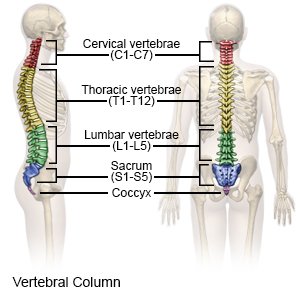Anterior Cervical Discectomy
Medically reviewed by Drugs.com. Last updated on Aug 4, 2025.
What do I need to know about anterior cervical discectomy?
Anterior cervical discectomy is surgery to remove one or more cervical discs from your neck. A cervical disc is material that cushions and separates the vertebrae of your neck. The discs help your spine support your head and protect your spine from being damaged when you move.
 |
How do I prepare for surgery?
- Your surgeon will tell you how to prepare. He or she may tell you not to eat or drink anything after midnight on the day of surgery. Arrange to have someone drive you home after surgery.
- You may need to have blood tests before your surgery. A cervical spine x-ray, CT scan, or MRI may be done to look at your neck, vertebrae, and discs before your surgery. You also may need tests to check the function of the nerves in your arms.
- Tell your surgeon about all your allergies. Include medicines, antibiotics, and anesthesia. Tell him or her about all medicines you currently take. He or she will tell you if you need to stop using any medicine before surgery, and when to stop. He or she will tell you which medicines to take or not take on the day of surgery.
Related medications
What will happen during surgery?
- You will be given general anesthesia to keep you asleep and free from pain during surgery. An incision will be made from the front of your neck to one side. Pins will be put into the discs above and below the disc to be removed.
- The disc will be removed along with any small bone pieces pushing on your nerves. Your graft will be put into the empty disc space, and the area may be filled in with bone chips. Screws and plates may be used to hold the disc securely in place and join your vertebrae together.
- The pins will then be removed. The incision will be closed with stitches. A bandage will be used to cover your surgical site. The bandage will keep the area clean and dry and help prevent infection.
What should I expect after surgery?
You will be taken to a room where you can rest until you are fully awake. Do not get out of bed until your healthcare provider says it is okay. A healthcare provider may remove your bandage soon after surgery to check your wound. When healthcare providers see that you are not having any problems, you may be taken back to your room.
- X-ray pictures may be used to check your vertebrae and the placement of any grafts, plates, or screws used during surgery.
- A neck brace may be used to help support your neck and hold it in the right position while you are healing.
- Pain medicine may be given. Do not wait until the pain is severe to ask for your pain medicine.
- You will be helped to walk around to help prevent blood clots. Call your healthcare provider before getting up for the first time. If you feel weak or dizzy while standing up, sit or lie down right away and call your healthcare provider.
- Physical therapy may be used to help you learn exercises to strengthen your muscles and relieve pain. You may continue physical therapy after you leave the hospital.
What are the risks of anterior cervical discectomy?
- Your nerves, spinal cord, blood vessels, or other tissues may be damaged during surgery. If the covering of your spinal cord is damaged, cerebrospinal fluid (CSF) may leak out. After surgery, you may have neck pain, swelling, or bruising. You may have a hoarse, rough voice and trouble swallowing. You may feel like you have something stuck in your throat and choke when you try to swallow. Your blood vessels may swell and you may get a life-threatening blood clot.
- If a bone graft was taken from your hip, you may have hip pain or bruising. The graft, plates, or screws used during your surgery may come loose. Your graft may collapse, break, or stick out into your spinal canal. The plates and screws may also become damaged and move into your spinal canal. You may need another surgery to fix these problems. Even with surgery, you may still have pressure on your nerves, and long-term neck problems.
Care Agreement
You have the right to help plan your care. Learn about your health condition and how it may be treated. Discuss treatment options with your healthcare providers to decide what care you want to receive. You always have the right to refuse treatment. The above information is an educational aid only. It is not intended as medical advice for individual conditions or treatments. Talk to your doctor, nurse or pharmacist before following any medical regimen to see if it is safe and effective for you.© Copyright Merative 2025 Information is for End User's use only and may not be sold, redistributed or otherwise used for commercial purposes.
Further information
Always consult your healthcare provider to ensure the information displayed on this page applies to your personal circumstances.
